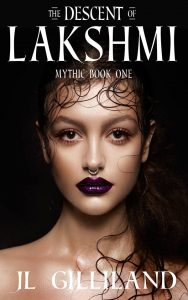21st March 2019
And now for something rather different. This month J L Gilliland is introducing us to the thought processes behind the writing of The Descent of Lakshmi, an historical fantasy. Welcome to An Author’s Mind, J L!
J L Gilliland: Thank you, Lizzie. I really appreciate the opportunity to do this.

Lizzie: So could you introduce us to the idea of historical fantasy by telling us something of the story of The Descent of Lakshmi.
J L Gilliland: It’s a pleasure. In a time before gods ruled India, the Mother—A Sacred Fig—stood guard over a small village in the Indus Valley. During a catastrophic storm, the Mother is struck down, undermining the Shaman’s leadership over Ganweriwala and igniting religious rivalries. Stakes escalate when Lakshmi, an outsider, is declared the Incarnated Mother and dragged into their conflict. She inadvertently awakens an embittered cosmic entity that threatens to consume the entire valley. Unless she can harness her energy, the humanity she came to experience will become the species she destroys.
Lizzie: Who is/are the hero(es)? Who are the villains? And why?
J L Gilliland: I hesitated to answer this question, then realized it plays a huge role in what I write and why. I don’t see people in absolutes but shades of gray. When I watch movies or read books, I want complexity in the characters: good reasoning and bad behaviors or maybe bad reasoning and good behaviors, etc. That said, I don’t consider any of my characters to be heroes or villains, but flawed people who are struggling to deal with difficult situations. They make good and bad choices, some that work and others that don’t. Sometimes they’re selfish and self-centered, other times they are generous. That gives me a lot of leeway to introduce unexpected situations.
Lizzie: Do you empathise with any of these people or wish you were more like them?
J L Gilliland: While writing the book, I first heard the phrase, “everyone is the hero of their own story,” and that really stuck with me. I have four POVs (Points of View) in my book: Lakshmi, the Shaman, the riverman, and the “villain.” When I got inside these very different people and saw the world as they saw it, I naturally became empathetic towards their viewpoint. That was particularly noticeable for me when I was working on the “villain.” The more I examined his underlying motives, the more I realized that his behaviors might be undesirable, but his reasoning was sound.
Lizzie: Do your characters change in your story? Is this important?
J L Gilliland: I have two advanced degrees and both have the same core focus: why do we do the things we do, and how can we be better. I wouldn’t write if I couldn’t delve into those same issues for my characters. Change is constant in our lives. Nothing stays the same. For that reason, my characters are constantly having to adapt to a changing environment, changing social structures, changing values, and even changing faith.
Lizzie: What moments in the novel do you like best?
J L Gilliland: Some of my favorite scenes are when Lakshmi is trying to adapt to her flesh. Because it is new to her she behaves like a child who is struggling to get her body to cooperate. Sensations are also new, so she tests and tastes everything. I had quite a few giggles over those sections.
Lizzie: They say all fiction is autobiographical. What is the most significant event/setting for you personally in the story and why?
J L Gilliland: The Shaman experiences a devastating blow to his faith that leaves him reeling. That scene is reminiscent of something I experienced in my own life. Of all the characters, I would say that I understand the Shaman the most because he is trying to make sense of a world that doesn’t make sense to him anymore.
Lizzie: When writing, do you like to plan in detail or set up a situation and see where it takes your characters?
J L Gilliland: In the past, I wrote by the seat of my pants and quickly realized that method doesn’t work well for me. For The Descent of Lakshmi, I plotted out the story using the following questions: “If” a cosmic entity clothes herself in flesh, “then” she would arrive naked. “Therefore,” she would consider clothes to be suffocating. “If” she considers clothing to be suffocating, “then” she would refuse clothes. “Therefore,” she feels every physical sensation, etc., etc. Once I had the logical progression of the story, I began constructing all the Scene and Sequel sections in the book. This method leaves out a lot of details, but provides me with the vital components.
Lizzie: What is the role of superstition and tradition or innovation and dystopia in this story?
J L Gilliland: I had to research shamanism and animism in order to create a world where people believe that spirits inhabit everything and can torment the living. Shamanism includes rituals like spirit-quests and blood sacrifices, as well as questionable healing practices. According to Vedic texts (written more than two thousand years after this timeframe), the Hindu gods were originally nature spirits (like animism). Because I never do anything easy, I decided that the villagers would be in the midst of a spiritual transition from pure animism to Mother worship. That transition will eventually involve Lakshmi.
Lizzie: What do you learn about change and social classes in this book?
J L Gilliland: This story occurs in the Indus Valley Civilization (also known as the Harappan Civilization and, the Meluhha Valley Civilization). Based on the layout of the cities, archaeologists believe there was a class hierarchy, so I included it in my book. The merchant and administrative classes would have lived on the Citadel, the tradesmen would live in the lower city. Issues involving social class structure play a significant role in the book.
Lizzie: How would you describe the genre of your book, if any? What drew you to this genre?
J L Gilliland: My genre is historical fantasy or mythology. It was a natural extension of my interests. I have studied ancient history for more than 20 years. I initially focused on the Mesopotamian region (Sumer in particular), but expanded out to the Indus Valley Civilization. It is part of the cradle of civilization, once surpassing 5 million people, including cities of over 50,000. They created modern city layouts, sophisticated sewage systems, learned to adapt to climate change, engaged in widespread trade, used standardized weights and measures, etc. And then there was the biggest mystery of all: why they disappeared from history for thousands of years.
Lizzie: How do you research a novel? How do you include what you learn?
J L Gilliland: In 2003, I began researching pre-historic Sumer (in Mesopotamia) for a different novel when I encountered information about the Hindu gods. I started researching their mythology online and in the library. I initially intended to place the story on another world (Viakuntha—a Hindu mythic world), but once I decided on prehistoric India/Pakistan, I started delving into archaeology, climatology, topography, linguistics, etc. I use the research to describe the village layout, buildings, floodwall, tools, clothing, trading routes, boats, other cities, food, farms, forests, climate, social hierarchy, bartering, etc.
Lizzie: What comes next?
J L Gilliland: The Rise of Lakshmi, Mythic Book 2 comes next. The final scene in the first book is not a cliff-hanger but it does introduce another situation and new characters. Since Book 1 only covers 5 days—and a lot happens in those 5 days—Lakshmi’s story is far from complete.
Lizzie: How far along are you with your new project?
J L Gilliland: As I was writing the first book, I began outlining the second. There was so much story that I decided to leave hints of ideas that I wanted to expand upon in a later book. Once I started keeping a record of these “hints” an actual outline emerged. And, of course, that began influencing the direction of the first story. Since I’ve just completed the first novel, I’m taking a breather before starting the second. I do hope to have it written by early Summer 2019.
Lizzie: Thank you so much for such perceptive insights into your writing processes. Always fascinating to hear how another author works!
JL Gilliland is an avid student of ancient history, mythology, and human motivation. She has been researching the Indus Valley Civilization and Hindu mythology since 2003, convinced there was an epic tale laying there, waiting to be written. That research culminated in the first Mythic novel, The Descent of Lakshmi.

If you want to learn more about this author, you will find information on her website and Facebook. And her books are available to buy on Amazon.
